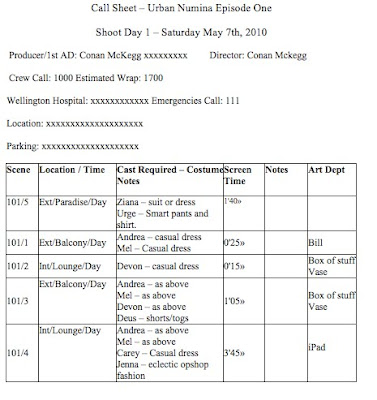
Generally you will have two such schedules. This is for cast and crew outlining the overall plan for the day. It outlines the order that scenes are planned to be shot in, when people are expected to show up and when they are expecting to wrap for the day.
It is important to note that you can rarely set a solid wrap time because shoots can run overtime or finish early. It is best to set your wrap time later than you intend to wrap because it will give you some breathing space in the event of the shoot running over time, and it also is a boost for cast and crew if you manage to finish early.
A good call sheet will allow you to break down your script, work out the order in which to shoot scenes and save you a lot of time planning and organising. It is really important to plan efficiently so as to not have actors sitting around half the day with nothing to do. Call sheets will help you plan out when the actors are required. An average day should net you 5-10 minutes of usable footage if you have an experienced cast and crew. 3-5 minutes if inexperienced. So roughly plan to shoot an hour per minute of footage you want to capture.
How did I work out the length of each scene. The standard belief in Hollywood these days is that a page of a script roughly translates to a minute of screen time. So you will need to make an estimate. If the scene takes up approximate a third of the page, it is likely to be about twenty seconds of screen time. There are always exceptions, but at the planning stage this tends to be a safe estimate to work with. Note that with much more dialogue driven scripts, scenes can end up running shorter or longer than they seem - based on performance and direction. But you generally will find the a page per minute ratio a good measure to work with.
The second schedule is a shots sheet. I haven't done one for Urban Numina mostly because they are very time consuming. A shot sheet resembles a call sheet but it is split up over each shot that you are planning to take. This is actually important, but I have included the shots in the storyboards, so I will be working straight off those. Because each episode is fairly short and low on complex visual effects, I can afford to do this. If you are planning to do anything that involves a lot of complex photography, FX or movement, a shot sheet is going to make your life a lot easier.

Above is an example of the storyboard for the opening scene of Urban Numina. This was created using Cinemek Storyboard on the iPhone. A word of caution, a small 7 minute storyboard takes a long time to render and upload as an e-mail. Be prepared to wait. Still the finished storyboard is great and comes in PDF format - which you can then load on a tablet like an iPad and have with you during your shoot. Because the storyboard allows me to split scenes down shot by shot, I can use it instead of a shot sheet. Normally storyboards are too big to have on set, so you go by a shot sheet instead.
Celtx also has a great tool for breaking down shots and preparing a shot sheet for you and is well worth the investigation.
Good planning does wonders for a project. It keeps morale up, because it convinces cast and crew that things are organised and will see completion. It helps reduce the downtime for people on set - actors love to act and hate sitting around waiting for their next scene. Keeping a good plan and schedule ensures you don't waste their time and they leave a shoot feeling positive and that they have done a good day's work. Actors who had to sit around all day long doing nothing tend to walk away feeling that their time was wasted and nobody knew what was going on.
Be prepared for plans to go awry - I often prepare notes for extra scenes in the event that suddenly we have to change shooting order etc. But if you have done your job right, your shoot should run relatively smoothly and be full of positive and excited people eager to see the project to completion.
Next: Rehearsals, and spreading word about the project...
Conan